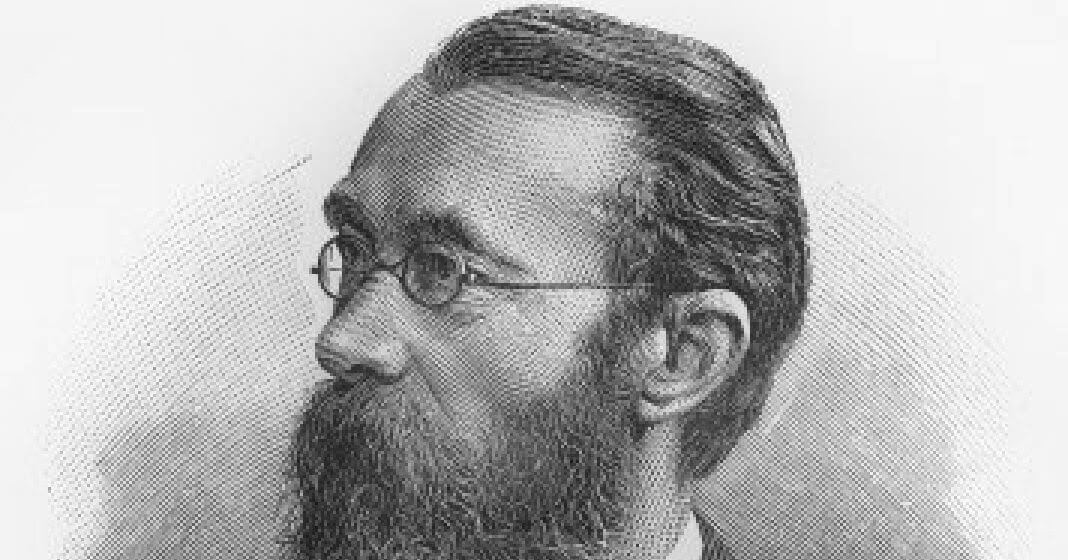10 Quotes by Wilhelm Wundt, a Father of Psychology

William Wundt was a German doctor, psychologist, and philosopher from a Protestant family. A professor at the University of Zürich and later Leipzig, he supervised over 200 doctoral theses. He also published over 500 works. The ones that stand out are Principles of Physical Psychology (1874) and the 10-volume Folk Psychology (1900-1920).

Wilhelm Wundt: merging psychology and physiology
At 23 years old, he received his doctorate in medicine summa cum laude. Two years later, he received his second doctorate after studying with the physiologist Müller. Wundt was a pioneer in combining philosophy and physiology, leading to psychology. He researched the boundaries between the physical and mental, using things that both of those disciplines could study.
“The attitude of physiological psychology to sensations and feelings, considered as psychical elements, is, naturally, the attitude of psychology at large.”
Physiology provided information about what we could perceive through our senses. On the other side, psychology was there to help us look inside ourselves. His concept of these two disciplines was the beginning of physiological psychology.
“The task of physiological psychology remains the same in the analysis of ideas that it was in the investigation of sensations: to act as mediator between the neighbouring sciences of physiology and psychology.”
An object of study: consciousness
He tried to flip around the philosophical questions that swirled around psychology back then. That meant we could stop looking at it as a world of ideas, like Descartes and Locke said. Instead, we could see it as a hard science.
“Psychology studies the mind and the laws which govern it.”
Here, Wilhelm Wundt clears up where he thought the limits and main goal of what he studied were. The point was to study things that could be measured, along with the structure of the mind.
“Our mind is so fortunately equipped, that it brings us the most important bases for our thoughts without our having the least knowledge of this work of elaboration. Only the results of it become unconscious.”
His structuralist or introspective psychology focuses on observing the conscious mind. It takes importance away from external behavior. Hence, per Wilhelm Wundt, the best way to see what went on in our psyche was experimental self-observation.
“The distinguishing characteristics of mind are of a subjective sort; we know them only from the contents of our own consciousness. ”

Ideas in constant movement
Wundt saw the mind as a dynamic, creative, and self-empowered force. He didn’t think we could ever understand it just by identifying its parts or its fixed structure. He said:
“An idea is no more an even relatively constant thing than is a feeling or emotion or volitional process. There exist only changing and transient ideational processes; there are no permanent ideas that return again and disappear again.”
Instead, it’s something we actually have to understand by looking at the way it moves.
“We speak of virtue, honour, reason; but our thought does not translate any one of these concepts into a substance.”
Ethnic or folk psychology
Wilhelm Wundt recognized that a purely “natural” focus wasn’t enough when it came to psychology. That’s why he thought that his physiological psychology (individual, analytical, and experimental) needed something else. It was folk psychology, also known as ethnic psychology or ethnology.
“The results of ethnic psychology constitute, at the same time, our chief source of information regarding the general psychology of the complex mental processes.”
Folk psychology studies the products of collective life (language, customs, myths, etc). From there, those products could tell us whether there were higher operations happening in our mind.
William Wundt thought that experimental psychology only stayed on the surface of our mind. Folk psychology, on the other hand, went much farther. He saw folk histories as a way of understanding human psychology and our different cultures. He sums it up like this:
“On the other hand, ethnic psychology must always come to the assistance of individual psychology, when the developmental forms of the complex mental processes are in question.”

The precursor to the scientific phase of psychology
His greatest achievement was to develop the first experimental psychology lab in Leipzig (Germany) in 1879. Because of this lab, psychology started to gain status as an academic specialization. That also meant more social and institutional support.
It was a landmark in psychology. That’s when its scientific phase started. But he was also very wrong when he underestimated other psychological branches. In the end, they’ve turned out to be just as important as the ones he inspired. But here’s what he said:
“Child psychology and animal psychology are of relatively slight importance, as compared with the sciences which deal with the corresponding physiological problems of ontogeny and phylogeny.”
There aren’t many people as important as Wilhelm Wundt in the history of psychology. The German researcher set the foundations for scientific psychology, and he was one of the first people to confront the issues with studying mental processes in a practical, evidence-based way.
William Wundt was a German doctor, psychologist, and philosopher from a Protestant family. A professor at the University of Zürich and later Leipzig, he supervised over 200 doctoral theses. He also published over 500 works. The ones that stand out are Principles of Physical Psychology (1874) and the 10-volume Folk Psychology (1900-1920).

Wilhelm Wundt: merging psychology and physiology
At 23 years old, he received his doctorate in medicine summa cum laude. Two years later, he received his second doctorate after studying with the physiologist Müller. Wundt was a pioneer in combining philosophy and physiology, leading to psychology. He researched the boundaries between the physical and mental, using things that both of those disciplines could study.
“The attitude of physiological psychology to sensations and feelings, considered as psychical elements, is, naturally, the attitude of psychology at large.”
Physiology provided information about what we could perceive through our senses. On the other side, psychology was there to help us look inside ourselves. His concept of these two disciplines was the beginning of physiological psychology.
“The task of physiological psychology remains the same in the analysis of ideas that it was in the investigation of sensations: to act as mediator between the neighbouring sciences of physiology and psychology.”
An object of study: consciousness
He tried to flip around the philosophical questions that swirled around psychology back then. That meant we could stop looking at it as a world of ideas, like Descartes and Locke said. Instead, we could see it as a hard science.
“Psychology studies the mind and the laws which govern it.”
Here, Wilhelm Wundt clears up where he thought the limits and main goal of what he studied were. The point was to study things that could be measured, along with the structure of the mind.
“Our mind is so fortunately equipped, that it brings us the most important bases for our thoughts without our having the least knowledge of this work of elaboration. Only the results of it become unconscious.”
His structuralist or introspective psychology focuses on observing the conscious mind. It takes importance away from external behavior. Hence, per Wilhelm Wundt, the best way to see what went on in our psyche was experimental self-observation.
“The distinguishing characteristics of mind are of a subjective sort; we know them only from the contents of our own consciousness. ”

Ideas in constant movement
Wundt saw the mind as a dynamic, creative, and self-empowered force. He didn’t think we could ever understand it just by identifying its parts or its fixed structure. He said:
“An idea is no more an even relatively constant thing than is a feeling or emotion or volitional process. There exist only changing and transient ideational processes; there are no permanent ideas that return again and disappear again.”
Instead, it’s something we actually have to understand by looking at the way it moves.
“We speak of virtue, honour, reason; but our thought does not translate any one of these concepts into a substance.”
Ethnic or folk psychology
Wilhelm Wundt recognized that a purely “natural” focus wasn’t enough when it came to psychology. That’s why he thought that his physiological psychology (individual, analytical, and experimental) needed something else. It was folk psychology, also known as ethnic psychology or ethnology.
“The results of ethnic psychology constitute, at the same time, our chief source of information regarding the general psychology of the complex mental processes.”
Folk psychology studies the products of collective life (language, customs, myths, etc). From there, those products could tell us whether there were higher operations happening in our mind.
William Wundt thought that experimental psychology only stayed on the surface of our mind. Folk psychology, on the other hand, went much farther. He saw folk histories as a way of understanding human psychology and our different cultures. He sums it up like this:
“On the other hand, ethnic psychology must always come to the assistance of individual psychology, when the developmental forms of the complex mental processes are in question.”

The precursor to the scientific phase of psychology
His greatest achievement was to develop the first experimental psychology lab in Leipzig (Germany) in 1879. Because of this lab, psychology started to gain status as an academic specialization. That also meant more social and institutional support.
It was a landmark in psychology. That’s when its scientific phase started. But he was also very wrong when he underestimated other psychological branches. In the end, they’ve turned out to be just as important as the ones he inspired. But here’s what he said:
“Child psychology and animal psychology are of relatively slight importance, as compared with the sciences which deal with the corresponding physiological problems of ontogeny and phylogeny.”
There aren’t many people as important as Wilhelm Wundt in the history of psychology. The German researcher set the foundations for scientific psychology, and he was one of the first people to confront the issues with studying mental processes in a practical, evidence-based way.
All cited sources were thoroughly reviewed by our team to ensure their quality, reliability, currency, and validity. The bibliography of this article was considered reliable and of academic or scientific accuracy.
Asthana, H. S. (2015). Wilhelm wundt. Psychological Studies. https://doi.org/10.1007/s12646-014-0295-1
Blumenthal, A. L. (1988). A reappraisal of Wilhelm Wundt. In A history of psychology: Original sources and contemporary research. https://doi.org/10.1037/0003-066X.30.11.1081
This text is provided for informational purposes only and does not replace consultation with a professional. If in doubt, consult your specialist.







